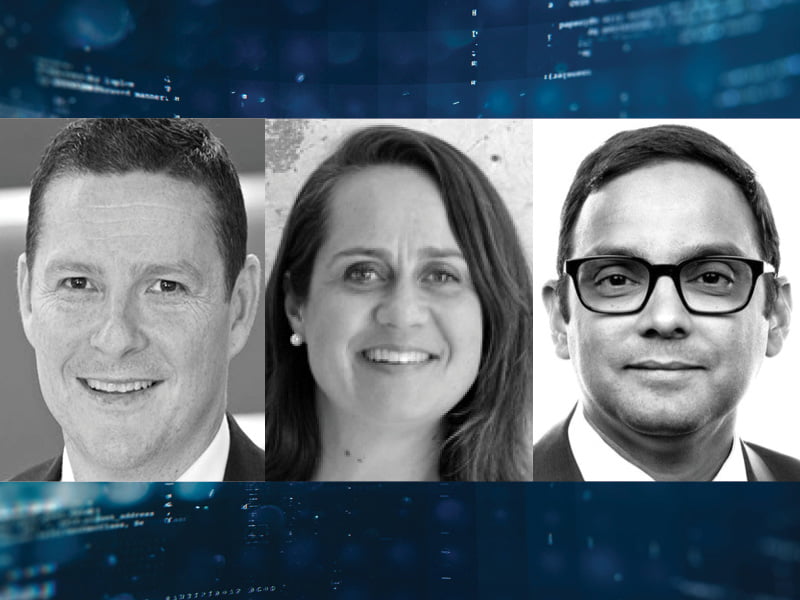“Be not afraid of greatness,” wrote Shakespeare. “Some are born great, some achieve greatness, and others have greatness thrust upon them.”
In this year of the pandemic, much the same could be said of digital transformation. There are companies ‘born digital’.
There are some on a planned path to becoming digital, and many others have had digital transformation thrust upon them to enable them to continue operating with a distributed workforce.
In this final episode in Verizon’s Age of Trust podcast series in which InnovationAus publisher Corrie McLeod discusses how businesses have responded and how they can maintain digital transformation momentum in 2021 and beyond with Verizon president of Global Enterprise, Sowmyanarayan Sampath and regional vice-president, Asia Pacific at Verizon Business Group Robert Le Busque.

Mr Sampath summed up 2020 with another quote, this one from Lenin: “There are decades where nothing happens; and there are weeks where decades happen.”
2020, he said, “feels like weeks when decades have happened as far as digitalisation and digitally enabling companies and enterprises goes.”
Mr Le Busque concurred. “We’ve seen organisations and markets that have been very traditional, very non-digital in the way that they’ve constructed their business models, rapidly accelerating to digital first agendas.
“Digital first decision making has escalated all the way to the board level. And it’s not just in enterprises, it’s also in government.”
Board level technology discussions and decisions are not new, but Le Busque said those discussions changed fundamentally in 2020.
“Discussions had all been around risk and exposure. Now they’re about opportunity and investment. So, the technology C-suite needs to bring a very different approach to the discussion.”
When an organisation has digital transformation thrust upon it the outcome is unlikely to be optimal and Mr Le Busque said organisations should now take pause, review their 2020 digital journey, and prepare themselves to better plan the next stage.
“The key for companies across the board will be to take a moment to pause and reflect on what’s happened this year, not only within their organisation, but within their industry, their competitors, their peers, their partners,” he said.
“They need to very deliberately and thoughtfully analyse what they saw that worked, and what was successful, either in their own shop or someone else’s, and then start to craft their strategies going forward based on those observations.”
Mr Sampath said there was some urgency to strategy development, because 2021 is likely to see a new imperative for digital transformation. But unlike COVID-19, which demanded a response, this new imperative will constitute an opportunity that organisations can choose to ignore, at their peril. That imperative is 5G.
“A lot of people think 5G is 4G, only faster, but it’s not,” Mr Sampath said. “We’ve got new capabilities we call ‘currencies’ with 5G that didn’t exist before and that opens up the innovation framework: latency, built-in security, device density and really low power requirements.”
He said organisations, if they are to innovate with 5G, must develop applications that make full use of these currencies.
“If you just use one of them, you’re not going to get the full value of 5G. You’ve got to use at least two, preferably three. Then you have a killer application in the making.”
Mr Sampath was not game to predict the killer app of 2021, but he cautioned against simply digitising existing processes.
“Going digital is not web enabling your current businesses and processes. Digital is all about the experience. It’s about looking at the underlying processes and cleaning up those processes so that it can be digitally enabled.
“Most processes are based on policies that were set in place 5, 10, 15, 20 years ago. So as we move to digital, we have to go back and clean up those underlying processes and policies to make them ready to take advantage of what 5G or even what 4G has to offer.”
Discussion then turned to the skills organisations will require to progress their digital journey. Le Busque identified three ‘legs’ to skills requirements: data, privacy and trust.
“When you give all of those a technology focus it brings real clarity to the types of skills you want to be looking for,” he said.
“Those three concepts more than anything else should inform and drive resourcing decisions for organisations, at least in the short to mid-term, as we seek to rebuild the economy and rebuild some of the markets that have been most heavily impacted.”
The Age of Trust podcast series was produced as a partnership between Verizon Business Group and InnovationAus.
Do you know more? Contact James Riley via Email.
